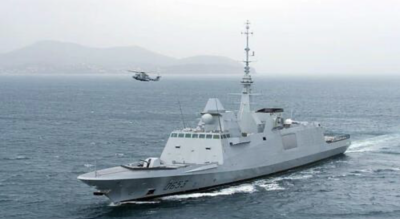French Navy Plows Through Million Dollar Missiles to Defeat Cheap Houthi Drones

All Global Research articles can be read in 51 languages by activating the Translate Website button below the author’s name (only available in desktop version).
To receive Global Research’s Daily Newsletter (selected articles), click here.
Click the share button above to email/forward this article to your friends and colleagues. Follow us on Instagram and Twitter and subscribe to our Telegram Channel. Feel free to repost and share widely Global Research articles.
New Year Donation Drive: Global Research Is Committed to the “Unspoken Truth”
***
A key reason that Yemen’s Houthis are unlikely to halt their attacks on Red Sea shipping as well as Western warships parked there is because immense pressure on the global transit waterway can be kept up, while it costs little to persist with such launches.
Many of the Houthis drones which are capable of reaching vessels far off the Yemeni coast have been estimated at not more than $20,000. Some of them are as low as a few thousand dollars to build. They can easily be intercepted by US and UK coalition warships, but at an immense cost for these Western militaries.
Anti-air missiles fired from coalition ships are commonly estimated at over $1 million each. This means the Houthis can keep the attacks coming, and on the cheap while watching Western warships blow through expensive arsenals.
This trend has been highlighted in a recent DefenseNews report which explored the high cost to the French navy of defeating the low-tech Houthi drones:
France’s maritime commander for the Indian Ocean defended the use of million-euro missiles to down dronesused by Yemen’s Houthi rebels to attack shipping in the Red Sea, citing the value of the lives and assets protected, and the sophistication of the threat.
The Languedoc frigate patrolling in the southern Red Sea in December shot down multiple drones using Aster 15 missiles, at a cost that defense analysts estimate at around €1 million (U.S. $1.1 million) per missile. The British Royal Navy’s HMS Diamond has also used the missiles to fend of drone attacks in the area.
The report further underscored that
“The economic calculus of ultra-capable interceptors, designed to counter expensive expensive anti-ship missiles or manned aircraft, quickly loses its appeal against drones costing thousands of dollars, analysts have warned.”
Still, commanders in the coalition are defending using these ultra-expensive missiles, saying all of this should be weighed in light of the necessary act of protecting valuable shipping lanes for Western economies.
Likely, the more sophisticated drones within the Houthi arsenal come directly from Iran. Tehran also has an interest in seeing Western navies bogged down in the Red Sea, and all the while they can use proxies to do it.
The Houthis don't need to sink or even strike a single ship to accomplish their goals. The Red Sea remains closed to Western shipping, Israel is effectively under a blockade, and the US and UK are depleting their costly stocks of weapons to bat away cheap drones and missiles. https://t.co/AwUTvAy2XX
— Jeff Wells (@JeffWellsRigInt) January 10, 2024
US officials have lately accused the Iranians of directly assisting the Houthis with targeting in the Red Sea. There’s at least one Iranian surveillance ship believed to be patrolling these waters at the moment. The situation is a ‘win-win’ for both the Houthis and Iranians, even after the recent rounds of Western airstrikes on Yemen.
*
Note to readers: Please click the share button above. Follow us on Instagram and Twitter and subscribe to our Telegram Channel. Feel free to repost and share widely Global Research articles.
Featured image: French navy frigate (Source: Zero Hedge)

